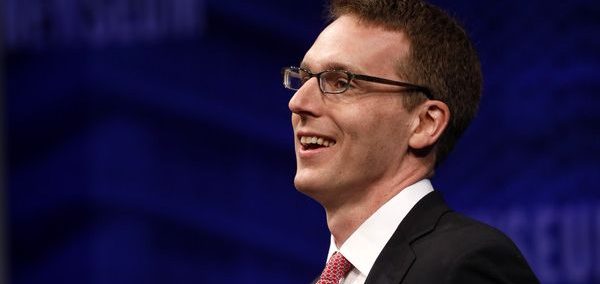
Pulitzer Prize winner David Fahrenthold lectures UMich on the use of Twitter under the Trump administration
‘Nobody consumes more news media than Donald Trump, he cares deeply about what the news media says’
David Fahrenthold, writer for The Washington Post and winner of the 2017 Pulitzer Prize, visited the University of Michigan this past Thursday to give a lecture on transparency in journalism under the Trump Administration.
Fahrenthold won his Pulitzer Prize after he set out to see if there were any gaps in the charitable donations Donald Trump announced at the Iowa Caucus in 2016. After yielding no results from calling the administration and possible recipients of the money, he took to Twitter and asked for the help of his followers.
Fahrenthold recognized this was unconventional but he had exhausted all of his old school resources. When this happens, you have to open up your methods and reveal to the public what you are trying to do, Fahrenthold said, "stretch your reporting as far as traditional reporting will let you."

"Twitter is a way to reach huge audiences quickly," Fahrenthold said. So he tweeted out for recipients to reach out to him about how much money they received but got as little information as he did from the calls. He realized that the reason he could not find where the money went was likely because it was never given.

At first the lack of responses was discouraging. However, by showing his followers what he knew and what he did not know he invited their input, their knowledge, and their suggestions. "It's a way of making a nonresponse into a story," Fahrenthold said. He did 90% of the work, he just needed the public to do the last ten.
His method was so successful he was able to discover that the money really was never given. He is credited with creating "a model for transparent journalism in political campaign coverage," according to the Pulitzer Center, for which he won his prize.
Trump referred to Fahrenthold as "a nasty guy" for his exposé, making him another journalist accused of putting out fake news. "They are chipping away at our credibility. There's no getting around that," Fahrenthold said in a response to what 'fake news' is doing to the credibility of journalism.
"Nobody consumes more news media than Donald Trump, he cares deeply about what the news media says," Fahrenthold said. "In his mind [fake news] is just a tactic, he doesn't really believe it."
Despite this, Fahrenthold stays as true to his nonpartisanship as he can, even under an administration that has had so much tension with journalists. "The thing that gives us meaning and value is our credibility," Fahrenthold said, "we're not at war, we're just at work." When he started his package on the Donald J. Trump Foundation he was not trying to prove that Trump had done something right or wrong, he was just committed to finding the truth in the story. He says that we have to reject this image that there is a rivalry between Trump and journalists because that is what Trump wants.
He is dedicated to maneuvering around the roadblocks that the new administration has posed for journalists. Especially when credibility is under attack, journalists have to make sure the information they get from sources like Twitter is correct. "You can't give up the gatekeeper role," Fahrenthold said.
The idea that false information is being circulated by credible journalists is heightening the fragile state of peoples' trust in the news. The concept of fake news is swaying some people and there is no stopping that some will believe that even true things are false. "You have to show people why what you do is better and more trustworthy," He said. There is no right way to completely fix this misconception, but credibility is key.
